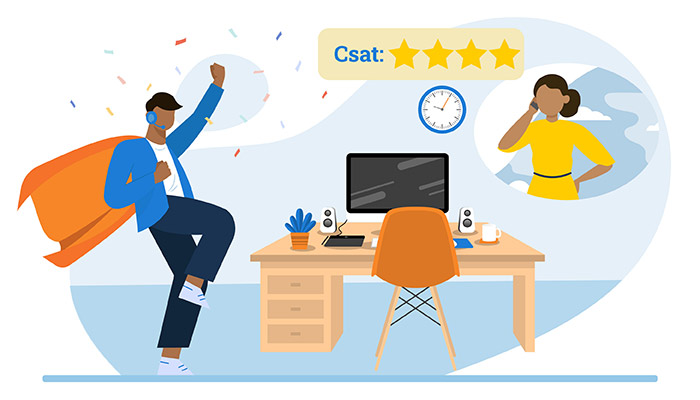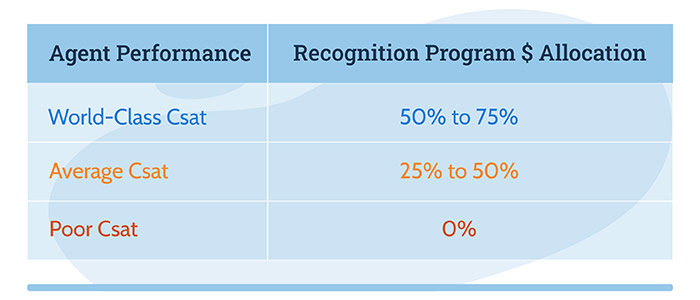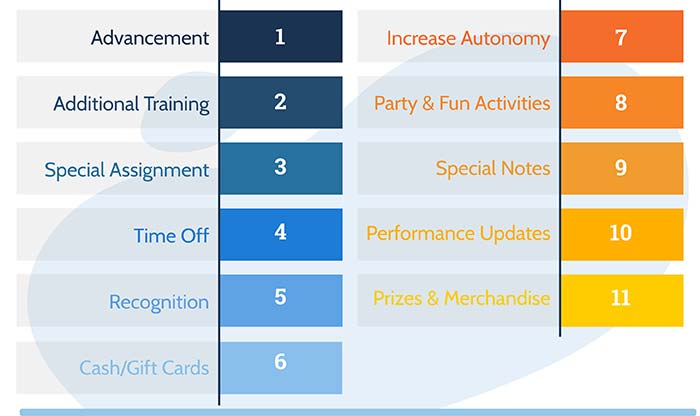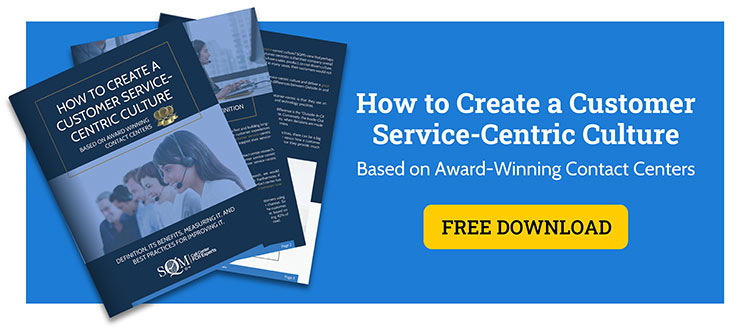Agent and Supervisor VoC Csat Certification
SQM's VoC certification program has been one of the most effective recognition practices for helping call center leaders motivate agents and supervisors to improve their First Call Resolution (FCR) and Customer Satisfaction (Csat) performance.
Most of SQM's top-performing call centers use a world-class customer service certification program for recognizing agents and supervisors. The basic premise of such programs is to let the customer judge the customer service they received and determine if they experienced a world-class Csat call.
Having a Csat certification program based on customers who have used your call center is considered the fairest, most accurate, and most meaningful way to certify your Agents and supervisors as world-class customer service performers. Agents and supervisors have more pride in being recognized by customers than by managers based on traditional operational metrics.

The Csat certification program requires using customer surveys. Therefore, your customer survey practices should have a minimum sample of five surveys for each Agent per month and be based on a post-call survey. We also recommend that Agents eligible for the world-class customer service certificate program have a minimum of 25 attributable surveys and be involved in the program for at least three consecutive months. Using at least three straight months of surveying ensures that the Agent consistently provides world-class customer service.
A world-class call is based on two key performance VoC indicators. Specifically, we define a world-class call as the customer being overall very satisfied (top box response) with the Agent, and their call was resolved. If 85% of the Agent's required surveys meet that criteria, the Agent is certified as a world-class Csat performing Agent. Combining the two key performance VoC indicators is a well-accepted practice for defining a world-class customer service call.
SQM has call center clients that use either the overall Csat with the call center or the overall Csat with the Agent or both Csat metrics and the call resolution metric to recognize Agents' performance.
Agent and Supervisor Recognition
The world-class Csat certification program creates a lot of excitement and a sense of accomplishment for certified Agents and supervisors. However, the recognition of being certified typically happens only once a year, so motivation to provide world-class service can deteriorate or become inconsistent throughout the year.
A good way to deliver consistent world-class customer service performance is to provide Agents and supervisors with $10 to $35 for each world-class survey they receive. This reward can take the form of cash or gift certificates (e.g., gas, retail, grocery store, and food) and should be paid out monthly.
SQM's research clearly shows that cash and/or gift certificates are preferred methods for showing Agents that you recognize and appreciate their performance. So again, connecting cash or gift certificates to a world-class survey is a best practice for motivating and recognizing Agents and supervisors for consistently providing world-class customer service.
The supervisor must give out the cash or certificates (e.g., extrinsic recognition) to the agents every month. Moreover, when handing out the money or certificates to agents, the supervisor must acknowledge their Csat performance (e.g., intrinsic recognition). The combination of extrinsic and intrinsic recognition has a proven track record for motivating Agents to deliver great customer service.
The use of operational metric qualifiers for the recognition program (e.g., adherence to schedule, average handle time) is a way to protect the call center from giving out recognition to Agents who have not performed to the operational metric's standards. In addition, agents should not receive recognition if they had an action alert survey in a given month, where they were the source of error for a non-FCR.
Again, an action alert survey is where the customer is very dissatisfied, the call was unresolved, and the Agent was the source of error for the call being unresolved. These two practices are very effective methods for ensuring that the Agents recognized for VoC performance have also performed to the standards on the traditional operational metrics and that the customer did not receive poor customer service.
Agents and supervisors should be provided daily updates on their desktops, informing them whether they are on track to achieve world-class Csat certification. In addition, supervisors should encourage and recognize Agents close to certification and Agents who are achieving certification level performance daily or weekly. The supervisor's encouragement and recognition are among the most powerful methods for motivating Agents to perform at the world-class Csat level.
Another best practice is to give awards to your certified world-class Csat Agents. An example of awards you can give out would be for the top ten world-class Csat Agents of the year for your call center and the Agent of the year Csat award. Again, the criteria you use should be based on actual VoC ratings and feedback stories captured in the survey process. First, have senior and middle management evaluate the VoC stories and determine the winners. Then, the VoC stories should be shared with all Agents and management. These stories define what world-class service looks like from a customer's experience perspective.
The Agent recognition program should have a minimum budget of $500 per Agent, with more recognition dollars provided to higher performing Agents. The breakdown of the $500 per Agent recognition dollar availability would be that world-class Csat Agents receive 50% to 75% of the total recognition dollars available, average performers receive 25% to 50%, and poor performers receive nothing (see Figure 1). A dollar example of this would be world-class Csat Agents recognition allocation of up to $700, average Agent performers have a recognition allocation of $300, and poor Agent performers receive $0.
Figure 1. Agent Recognition Program Dollar Allocation

Agent Ranking of VoC Recognition Motivators
The below figure shows SQM's focus group results for Agent ranking of VoC recognition motivators.

Top Agent Recognition Motivators:
- Advancement is career opportunities based on Agent VoC performance.
- Additional Training gives the opportunity to advance career performance.
- Special Assignments are closely aligned to the number 1 motivator because they give Agents the opportunity to advance within the call center or the organization based on their VoC performance.
- Time Off provides a balanced lifestyle.
- Recognition is where Agents' VoC performance is recognized in either a group or a private setting.
- Cash/Gift Cards provide Agents with gift cards for their VoC accomplishments, many of whom use those gift cards for their day-to-day living expenses (e.g., gas, food, and merchandise).
- Increase Autonomy is for Agents who want less supervision because they have a high-performance VoC track record.
- Party and Fun Activities provide an opportunity for Agents to celebrate their VoC performance with other employees.
- Special Notes acknowledges Agent VoC performance with a congratulatory note. When the note comes from their supervisor, they like to receive it through an email or note card; however, when it comes from senior management, they like to receive it on a typed, signed letterhead or on a signed notecard.
- Performance Updates are for Agents who are self-motivated and just need to be kept informed of, or have access to, their VoC performance.
- Prizes and Merchandise is for Agents who like to receive company-branded merchandise for their VoC performance.
Quick Related Links
First Call Resolution Definition First Call Resolution PPT First Call Resolution Benefits
First Call Resolution Strategies First Call Resolution Operating Philosophy Call Handling Best vs Worst Agents Agent Recognition Celebrating Agent Success QA Form Customer Quality Assurance Survey Data Calculate FCR Rate What is a Good FCR Rate? VoC Closed-Loop Top 10 CX Metrics Agent Recognition Case Study Agent Coaching and Recognition

